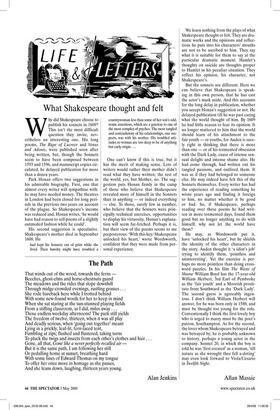What Shakespeare thought and felt
Why did Shakespeare choose to publish his sonnets in 1609? This isn’t the most difficult question they invite, nevertheless an interesting one. His long poems, The Rape of Lucrece and Venus and Adonis, were published soon after being written, but, though the Sonnets seem to have been composed between 1593 and 1596, and manuscript copies circulated, he delayed publication for more than a dozen years.
Park Honan offers two suggestions in his admirable biography. First, one that almost every writer will sympathise with: he may have needed money. The theatres in London had been closed for long periods in the previous two years on account of the plague. So Shakespeare’s income was reduced and, Honan writes, ‘he would have had reason to sell poems of a slightly outmoded fashion while he could’.
His second suggestion is speculative. Shakespeare’s mother died in September 1608. He
had kept his Sonnets out of print while she lived. Their bawdry might have troubled a countrywoman less than some of her son’s odd, ironic assertions, which are a gateway to one of the most complex of psyches. The most tangled and contradictory of his relationships, one suspects, was with his mother. His troubled attitudes to woman are too deep to be of anything but early origin ....
One can’t know if this is true, but it has the merit of making sense. Lots of writers would rather their mother didn’t read what they have written; the rest of the world, yes, but Mother, no. The suggestion puts Honan firmly in the camp of those who believe that Shakespeare revealed more of himself in the Sonnets than in anything — or indeed everything — else. To those, surely few in number, who believe that the Sonnets were principally technical exercises, opportunities to display his virtuosity, Honan’s explanation will seem far-fetched. Perhaps it is, but their view of the poems seems to me preposterous. ‘With this key/ Shakespeare unlocked his heart,’ wrote Wordsworth, confident that they were made from personal experience. We learn nothing from the plays of what Shakespeare thought or felt. They are dramatic works and the opinions and reflections he puts into his characters’ mouths are not to be ascribed to him. They say what it is suitable for them to say at the particular dramatic moment. Hamlet’s thoughts on suicide are thoughts proper to Hamlet in his peculiar situation. They reflect his opinion, his character, not Shakespeare’s.
But the sonnets are different. Here we can believe that Shakespeare is speaking in this own person, that he has cast the actor’s mask aside. And this accounts for the long delay in publication, whether you accept Honan’s suggestion or not. He delayed publication till he was past caring what the world thought of him. By 1609 he had little reason to fear its opinion. It no longer mattered to him that the world should learn of his attachment to the fair youth — or youths, for Auden is surely right in thinking that there is more than one — or of his tormented obsession with the Dark Lady, cause of intense sensual delight and intense shame also. He had come through, had written out his tangled passions, and outlived them. It was as if they had belonged to someone else. He may indeed have felt this of the Sonnets themselves. Every writer has had the experience of reading something he wrote years ago and finding it foreign to him, no matter whether it be good or bad. So, if Shakespeare, perhaps reading over these poems he had written in more tormented days, found them good but no longer anything to do with himself, why not let the world have them?
He may, as Wordsworth put it, have ‘unlocked his heart’, but he shields the identity of the other characters in the story. Auden thought it ‘a idiot’s job’ trying to identify them, ‘pointless and uninteresting’. Yet the exercise is perhaps no more pointless than doing crossword puzzles. In his film The Waste of Shame William Boyd has the 17-year-old William Herbert, 3rd Earl of Pembroke as the ‘fair youth’ and a Moorish prostitute from Southward as the ‘Dark Lady’. The second guess is agreeably ingenious. I don’t think William Herbert will answer, for he was born only in 1580, and must be thought too young for the role. Conventionally I think the first lovely boy who is urged to marry must be the poet’s patron, Southampton. As for the second, the lover whom Shakespeare betrayed and was betrayed by, he is probably unknown to history, perhaps a young actor in the company. Sonnet 20, in which the boy is told he was ‘first created’ as a woman, ‘till nature as she wrought thee fell a-doting’ may even look forward to Viola/Cesario in Twelfth Night.
Allan Massie


















































































 Previous page
Previous page